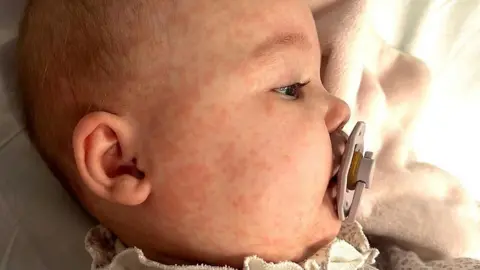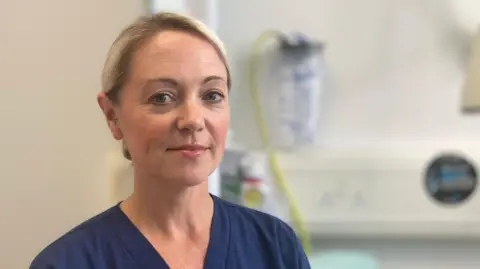Sharon BarbourHealth correspondent, BBC North East and Cumbria
 Supplied
SuppliedNowhere in the north-east of England and Cumbria has the childhood measles, mumps and rubella (MMR) vaccination rate of 95% needed to achieve the “herd immunity” at which point disease does not spread, latest figures show.
Middlesbrough has the lowest rate in the region at 82.5%, but up from 77.9% the previous year.
The mother of one child – too young to have the MMR but who could have been protected by herd immunity – said the experience of her having measles at the age of seven months had been “terrifying”.
Medical director for The North East and North Cumbria Integrated Care Board, Dr Catherine Monaghan, warned measles was dangerous and “one of the most infectious diseases in the world”.
Middlesbrough had the region’s largest vaccination rate increase in 2024-25 while Cumbria had the highest overall rate in the area but saw it drop slightly from 94.8% in 2023-24 to 94.3%.
Of 12 local authority areas in the region, eight have seen a slight or moderate increase but still range between 82% and 94%.
Health experts fear a falling vaccination rate could lead to further outbreaks.
They say children should have both doses of the MMR jab to be fully protected and prevent the virus being passed on to other children and vulnerable people who have not been able to have it.
 Supplied
SuppliedSinging teacher Scarlett Jones, from Bishop Middleham in County Durham, said her daughter suddenly became seriously ill in August last year.
“She was just laid on her back, staring at the ceiling, very unresponsive,” the 29-year-old said.
The baby’s temperature was 39.4C (102.9F), she was becoming more floppy, her eyes were red and swollen, and she was struggling to breathe, she said.
Although paramedics arrived within minutes and knew the baby needed to go to hospital, Mrs Jones could not contact her husband Dan, a professional footballer, who was in training.
“They’re not allowed their phones at all,” she said.
“So I rang the club shop and somebody ran down to the field.”
As the baby’s temperature continued to rise, doctors first considered sepsis, then meningitis, before she then developed a rash and a consultant found distinctive white spots in her mouth.
“It took a while for them to diagnose measles as they had never seen a case of it before,” Mrs Jones said.
The doctor asked if medical students could be brought in, because they had never seen then disease first hand, she added.

Measles normally clears up within seven to 10 days but can cause serious complications.
Dr Monaghan said: “Measles is one of the most infectious diseases in the world and it can be very, very dangerous.
“It can cause pneumonia, it can also cause a swelling of the brain that can leave you with catastrophic, life changing illnesses – so blindness, deafness.
“The worst case scenario is you can die.”
Dr Monaghan said doctors were worried about the resurgence of the virus, with babies and young children, pregnant women, and those with a weakened immune system at increased risk.
The disease was 95-98% preventable with the MMR vaccine, she said.

Measles had been largely been eradicated but, as the uptake of the jab has fallen, the number of cases has grown.
Child health experts have said some parents may not vaccinate their children because they underestimate the seriousness of the disease.
After the MMR was introduced, concerns were raised that it was linked to autism.
In 1988, researcher Andrew Wakefield incorrectly claimed the two were connected but his work was later dismissed and he was struck off by the General Medical Council in 2010.
Rates also fell during the Covid-19 pandemic, as routine appointments were missed.
The World Health Organization says 95% of a population needs to be vaccinated to prevent outbreaks and protect the unvaccinated.
Figures from the UK Health Security Agency for 2024-25 suggest 91.9% of five-year-olds in England had received one dose of the MMR vaccine, unchanged from the previous year and the lowest level since 2010-11.
MMR doses are routinely given at one year old, and three years and four months.
Older children and adults can have the jab if they have not been vaccinated earlier.
As children head back to school there are concerns that there could be a surge in cases.
Dr Monaghan said the two doses gave protection against “something that can be catastrophic, and potentially fatal”.


